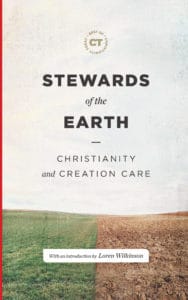
In this excerpt from the introduction to Stewards of the Earth: Christianity and Creation Care, Loren Wilkinson reflects on the varying attitudes evangelical Christians in America have had towards environmental concerns and creation care over the last 50 years.
Over the last half century we humans have become gradually aware that our presence is damaging the overall health of the planet. The articles, interviews, and editorials in Stewards of the Earth provide an overview of the way evangelical Christians in America have responded to that awareness. They reflect attitudes which are variously insightful, inspiring, and obtuse. Together they reveal both complex tragedies and deep reasons for hope.
One can read them in several ways. One way is to see them mainly as a good sampling of the whole culture’s response. At first, they are both alarmist and superficial. The first, a 1970 editorial warning that we have failed in our “cultural mandate” to exercise proper dominion, takes seriously a speculation that life on the planet could be over in thirty-five years (that was over fifty years ago!), and suggests that environmental destruction may be God’s way of bringing about the end times. That editorial stresses things like litter, dirty rivers, and crowded campgrounds, but only after a couple of decades does the real seriousness of the problem begin to sink in. The first mention of climate change is Bill McKibben’s 1995 article about Christmas, TV, and consumerism. Subsequent articles, while backing off from predictions about the end of the world, reflect the realization that the environmental movement is no passing fad but an unavoidable warning that our civilization must change.
Another way to read the articles is as a portrait of the particular concerns of American evangelical culture. While the first editorial sounds an alarm, the second, published just before the first Earth Day in 1970, sounds a warning. Titled “Ecologism: A New Paganism?” it (like many of the early articles) strongly disagrees with historian Lynn White’s influential 1967 case that Christianity bears a “huge burden of guilt” for environmental problems. And it points out that the ranks of environmentalists are filled with pagans, pantheists, and other heretics.
Those early articles point to one of the tragedies evident in the collection, second only to the planetary tragedy the articles respond to: the growing polarization in American culture. That dichotomy puts evangelical Christians, united in their suspicion of science and their opposition to abortion, on one side of a great divide, and on the other side are environmentalists, pagans, new-agers, and most scientists. It’s clear that CT is trying to bridge that divide.
A Biblical Basis for Creation Care
But there are strong reasons for hope, and though I have begun this introduction with the darker side of this collection, I want to end with the light it provides. Almost all of the articles make plain—with growing depth and insight—the strong biblical basis for the care of creation. They recover biblical truths that cultural controversies have obscured: that God delights in a creation he sees as good; that creation (however human sin has marked it) is still “very good”; that in the incarnation God reaffirms that goodness; that in Christ (whom Mary Magdalene profoundly mistook for a gardener) the Creator gives back to redeemed imagebearers the gardener’s task to till, keep, and care; that whatever our understanding of eschatology, God’s ultimate purpose for creation is its renewal, not its destruction. David Neff’s 2007 article “Second Coming Ecology” makes that point clearly.
A third way in which these essays can be read is as a way of recalling one’s own life and thought at the time these pieces were written. Here I must be a bit autobiographical, for I have been involved as an “evangelical environmentalist” with the subject of these essays over the whole span of their composition. In fact, I wrote four of them (including a report to CT from the Rio Earth Summit in 1992). As a graduate student I was involved (quixotically) in the first Earth Day in 1970; my wife and I began one of the first Christian Environmental Studies programs at Seattle Pacific College in 1974 (read more about the proliferation of such programs in the “Higher Education” part of Randy Frame’s 1996 article, “The Greening of the Gospel”); and I was part of Calvin College’s first “Center for Christian Scholarship” project in 1977–78, which produced the book Earthkeeping. The topic we were given (and the subtitle of the first edition of that book) was “Stewardship of Natural Resources.” When we updated it ten years later, we noticed the unbiblical anthropocentrism of that title. So the 1990 edition had the wiser subtitle, “Stewardship of Creation.” On that project I joined a physicist, an economist, a philosopher, and the biologist Cal DeWitt.
Since 1981 I have taught at Regent College, a Canadian graduate school of theological studies, where it has been my privilege to teach evangelical students from all over the world, many with deep environmental concerns—and in that process to meet or have as colleagues several of the authors in this collection. We are now dual citizens of both the United States and Canada, and that perspective, plus my international students and colleagues, has kept me from giving up on the word “evangelical.” The gospel is not a political label, but it is “glad tidings” for the whole earth.
One of those people I met at Regent is Peter Harris, who with his wife Miranda founded A Rocha, an international Christian conservation organization now working in over twenty countries. He came as a “missionary in residence” to Regent in 1996, where he met Eugene Peterson. The interview with Harris and Peterson by Andy Crouch in 2011 (“The Joyful Environmentalists”) gives a good picture of the truth that is being recovered in this collection of essays: that the work of “environmentalism” is part of the gospel. It’s caught biblically in Peterson’s translation of Philippians 2:15: “Go into the world uncorrupted, a breath of fresh air in this squalid and polluted society. Provide people with a glimpse of good living and of the living God” (Message). Harris (in Crouch’s interview) agrees:
I think the Christian vision of conservation is exactly as Eugene framed it. It’s a wider one that has to do with human flourishing. … Ecological consequences of the broken relationship with God [appear] all the way through Scripture. But at the same time, there’s the phenomenal hope that as people are restored in Christ to a right relationship with God, there will be a restoration of our relationship to creation and healing for the creation.
This post was adapted from Stewards of the Earth: Christianity and Creation Care (Lexham Press, 2022).







